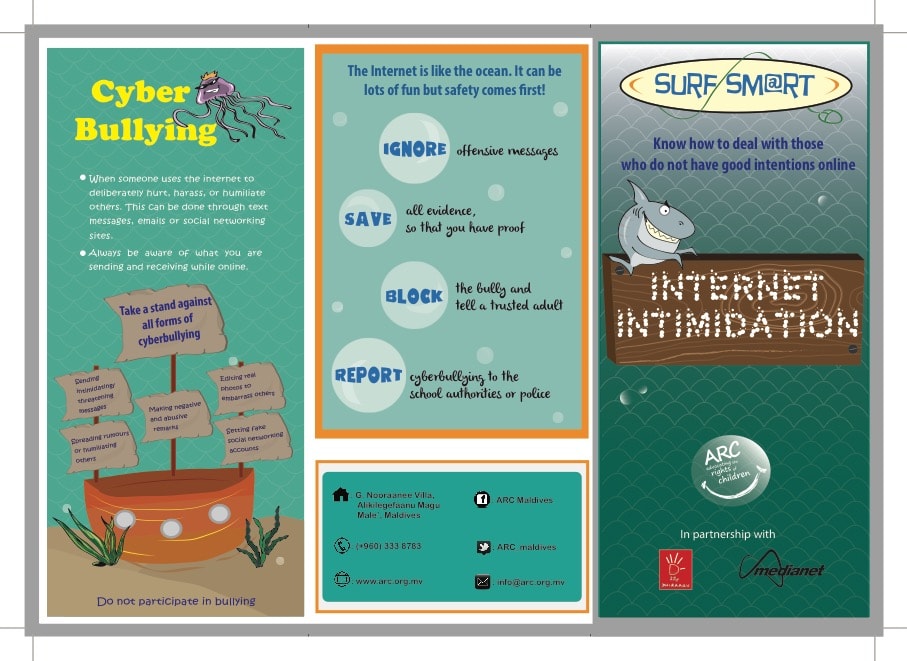
Brochure


Cyber bullying is when someone uses the Internet or modern communication technology (mobile phone, text messages, email or social networking sites) to deliberately and repeatedly hurt, harass or humiliate other people. Bullies often have low self-esteem and may even have been a victim of bullying in the past. However, bullying or cyber-bullying is NEVER acceptable and you should not have to put up with it.
Cyber-bullies are abusive and make negative comments, to torment, threaten, pick on or intimidate someone. Examples of cyber-bullying include sending anonymous threatening emails, spreading rumours online to break up friendships or relationships, setting up an unkind or unpleasant fake social networking account or editing real photos to embarrass others. Cyber-bullies might also befriend you online and then use information you have given them against you, to upset you.
Always be aware of what you’re sending and receiving whilst online. Just like talking in person, respect and politeness is necessary when using the Internet too. Never write or post anything that you wouldn’t say to a person face to face. It is important to be accepting of individual differences and to learn tolerance and respect for diversity.
Do NOT participate in mocking or forwarding insulting pictures, abusive messages or harassment about a person online. This would mean contributing to cyberbullying! You may think it is a joke, but it would be really upsetting for the person involved and this would even be a crime.
Standing back and letting it happen can be just as bad. If you see that someone is being threatened or hurt by others online, offer them support or inform an adult you trust so they can help make it stop.
Since Cyber-bullying is done online in a virtual world, it can affect someone not just in school but also continue throughout the day, making someone feel threatened at home as well. It can also sometimes have a larger audience or be hard to find out who the bully is, if they post something on a website anonymously. However, it is possible to always save proof of cyber bullying (emails, websites, IMs), unlike normal bullying which is usually someone’s word against another person. A positive thing about cyber-bullying is that it can be evidenced and saved as proof. This can then be reported to the relevant authorities including school or police to catch the bullies.
If you are being targeted by bullies online:
Try to resist the temptation to reply to offensive messages
Try not to reply or react to things cyber-bullies say or do, as it could make the situation worse.
Save all evidence of the bullying behavior
If you receive abusive emails or have upsetting things posted on your profile, save them to your computer so that you can use it as proof. Also learn how to save conversations.
Block them and tell a trusted adult
Learn how to block the bully on IM or delete them from your contacts on social media. Tell an adult you trust about what is going on, so that they can help and offer support.
Report the bully
If you are bullied online, do not hesitate to report it to authorities (school and/or police), and to the website/service operator.
Cyber bullying is really scary and extremely hurtful for the person being bullied as lots of people could be seeing the mean things that have been said and done. If you see anything that looks like cyber bullying or know someone is being cyber bullied, it is your duty to report it. Tell an adult you trust about what is going on and they will be able to help offer support to the person who is being bullied online.
– Do you know that a careless comment, a thoughtless moment or an innocent photo posted online can quickly turn into a nightmare for you?
Anything you share online, is out of your control – other people can do anything they want with it. This is the case with all information, including comments, photos and videos. Across the world, children and teenagers have and continue to suffer as a result of abuse they have received online, or as a result of information or images they have shared online.
A photo posted on Facebook, Twitter or other social media may bring smiles to friends and family, but it may also reach the wrong eyes. This is because there are many people who misuse the Internet, to get inappropriate photos of teenagers or young children for their own purposes. People who are looking to abuse children and teenagers online, can often manipulate relationships and pressure you into doing things you feel uncomfortable with. This includes talking in a way that you don’t like, asking you to do things on Skype or other mediums using webcam or with your camera that feel wrong or uncomfortable or making you feel anxious or trapped in a romantic relationship. If someone you are talking to wants you to share an explicit or intimate photo or video of yourself, say NO and tell a trusted adult! Even if the person is someone you know in the real world, can you really trust that person? You may think so now, but things can change in the blink of an eye - what if you have an argument with them tomorrow and they show the photo to everyone at school, how would you feel? They can post it online and your family, teachers and the rest of the world can see it. It will also be there for your own children to see when you grow up!
If you have experienced abuse online or offline, please visit www.arc.org.mv/hope for more information on child abuse and how to move forward.
Remember that your identity online and reputation can affect your real life too. Be aware that nothing on the Internet is 100% private and that everything you post online is there forever, so even if you delete it, Twitter, Facebook or other online social media sites keep a record of it. This holds even more weight as children get older because the Internet, particularly social media background checks have also now become a part of university or even job application process.
Keep clean online reputations and always think twice before you post or share anything online Future employers or universities often look at your online reputation including previous posts – is there anything there you wouldn't want them to see? Some employers will also search your name on Google to check your online behaviour and see if they find anything. Be aware that everyday, the lives of many young people are affected by irresponsible and illegal things they may have said or done online, a long time ago. Privacy matters for your long-term best interests - if you wouldn’t want the whole world to see it in the future, then don’t post it online today. It is up to you to manage your online reputation.